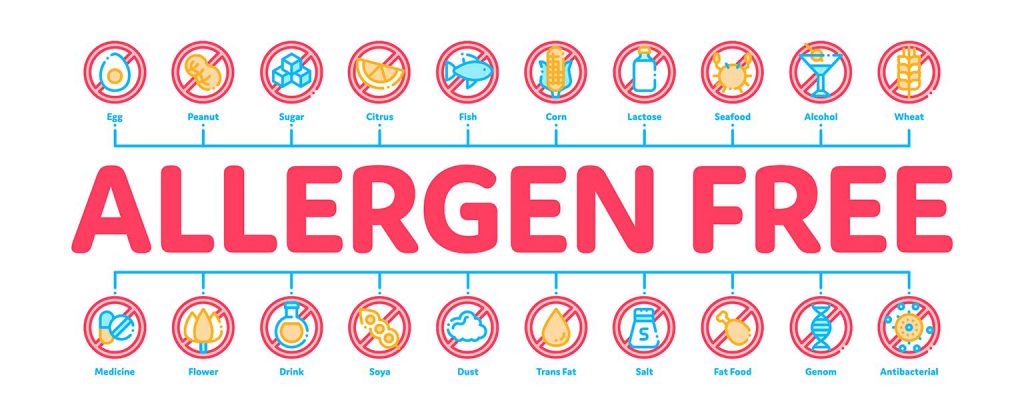An Ultimate Guide to Food Allergies in Adults
Research findings indicate that food allergies in adults are more common than you might previously have thought and are likely to be more serious in comparison to food allergies in children.
In accordance with The BBC, the world has recently seen an increase in food allergies in adults, particularly in Europe, the UK and Australia.
As food is part of your daily life, it is important to take action now to protect yourself from developing any food allergies in the future.

Table of contents
- An Ultimate Guide to Food Allergies in Adults
- Why do food allergies develop in adults?
- Can food allergies cause eczema in adults?
- Can food allergies cause ear infections in adults?
- Most Common Food Allergies in Adults
- Symptoms of Food Allergies in Adults
- Vitamin d deficiency and food allergies in adults
- Food allergies and weight gain in adults
- Food allergies in older adults
- How to Prevent Food Allergies in Adults
- How to identify food allergies in adults
- Can food allergies go away in adults?
- Takeaway
Why do food allergies develop in adults?
You might be curious about what causes food allergies in adults. Many studies indicate that there are a number of factors that influence you to be allergic to food. Here are when can food allergies develop in adults:
1. Any of your family members have been diagnosed with asthma eczema or hay fever before.
2. You have previously had a food allergy. This will increase the likelihood of developing any additional food allergies.
3. Your medical history includes asthma. People usually develop asthma and a food allergy at the same time which together can intensify the symptoms.

Can food allergies cause eczema in adults?
Eczema and food allergies in adults are related in that a large number of people with eczema also have food allergies. However, this varies case by case. Only someone will have eczema after having the following foods: shellfish, fish, nuts, gluten, soy products, eggs and cow’s milk.
Having specific diets does not directly result in eczema. However, it might cause an outburst if you already have the medical condition.
Knowing your body inside out and which foods are a best fit with you personally is best. Alternatively, here are types of anti-inflammatory food that you should have if you would like to alleviate eczema outbursts: fatty fish, quercetin-rich food such as apples, cherries, broccoli, and spinach and probiotic food such as yogurt and sourdough bread. Be mindful that eczema-friendly food can still cause outbursts for people who are allergic to them.
Can food allergies cause ear infections in adults?
Food allergies and ear infections in adults are connected in that if food allergies are not properly controlled, they can cause ear infections in adults.

Most Common Food Allergies in Adults
The most common food allergies in adults include cow’s milk, eggs, fish, peanuts, shellfish, soy, tree nuts and wheat.
Symptoms of Food Allergies in Adults
The most common food allergy symptoms include:
• Abdominal pain, diarrhea, nausea or vomiting
• Dizziness, lightheadedness or fainting
• Hives, itching or eczema
• Swelling of the lips, face, tongue and throat or other parts of the body
• Tingling or itching in the mouth
• Wheezing, nasal congestion or trouble breathing
Vitamin d deficiency and food allergies in adults
The deficiency of vitamin D can result in food allergies in adults. Research suggests that anaphylaxis to various triggers (such as foods, medicines, and insect stings) occurs at much higher rates in areas with less sun exposure (northern climates). Another study indicates that vitamin D can activate certain regulatory immune system cells that prevent the release of chemicals that bring about allergic diseases and make them even worse.
Food allergies and weight gain in adults
If your weight has increased while also having the symptoms of food allergies mentioned above, there could be a link between these two things. Your doctor can help determine if your symptoms stem from any food allergies as well as recommend an allergy management plan that works best for you.
Food allergies in older adults
Older adults are at higher risk of food allergy because of their aging immune systems. Aging causes dysregulation which can lead to the development of a new food allergy. Food allergy is a rising medical concern in the elderly.
How to Prevent Food Allergies in Adults
The key to preventing food allergies in adults is to avoid all the foods that cause you allergies altogether in the first place.
How to identify food allergies in adults
To determine food allergies in adults, you are advised to take a test for food allergies in adults with an immunologist (a doctor who specializes in allergies).
Can food allergies go away in adults?
Tree nut, peanut, and shellfish allergies that show up especially in adults cannot go away easily and tend to persist.

Takeaway
On the whole, food allergies in adults can cause fatal reactions and the key to treat it is to get rid of the food that you are allergic to from your daily cuisine. If you are uncertain whether you are allergic to any food or not, do consult your doctor about it as soon as possible.

